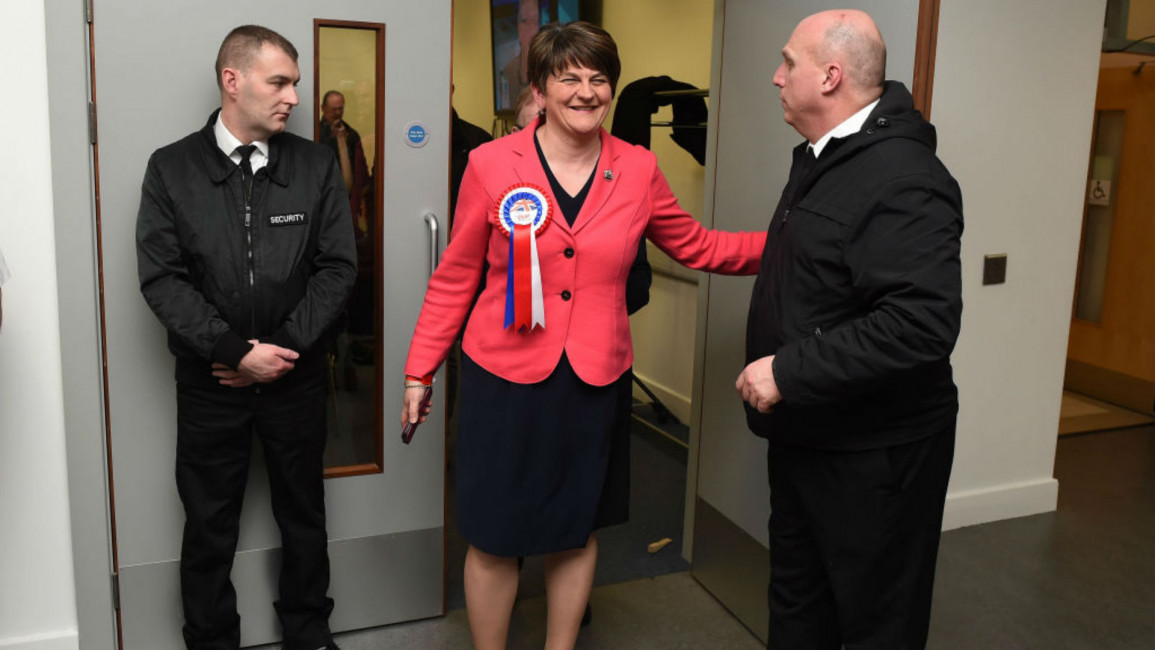
What will the UK's extremist DUP mean for Palestine?
"Strong and Stable" and "Coalition of Chaos" were Theresa May's two election mantras, warning UK voters not to gamble on a government led by Labour. But it is May who has plunged the country in to a period of uncertainty by failing to secure a majority in the House of Commons.
The Conservative minority, propped up by the 10 MPs of the Northern Irish Democratic Unionist Party (DUP) now governs, but, it is the opposition Labour party that increasingly looks strong, stable, coherent and capable of stepping in, should a chastened May fail to mount a serious comeback.
Illiberal
The DUP were already known as being among the most illiberal of UK political movements, and the mass Googling of these initials in the past few days will have revealed just why: The party once appointed climate change denying MP Sammy Wilson as Northern Ireland's environment minister; they oppose gay marriage, with MP Ian Paisley, son and namesake of the DUP's founder, going on the record to express his hatred of homosexuality.
In 2014, then leader Peter Robinson was forced to apologise after defending Islamophobic remarks made by an evangelical preacher. The party is strongly anti-abortion, leaving it on a collision course with progressives, but with much in common with the Conservative and Unionist party, to give the Tories their full title.
 |
The DUP therefore have an instinct and a motive to vigorously defend and promote Israel |  |
Climate change denial, homophobia and religious hatred all put the DUP out of step with the wider UK population, which swung back to Labour thanks to its positive, inclusive manifesto. The DUP's social stances are generously being labelled "conservative" by the media but their stances are better described as puritanical and at times sinister.
The party's foreign policy is along similar lines. A Protestant party with parochial preoccupations, the DUP still has a firm, and very hawkish, foreign policy stance, one that enhances their compatibility with May's Conservatives.
British colonial legacies
Northern Ireland and Israel were both created out of British colonial separation policies in the early twentieth century. As a result, both are anachronistic and governments in both countries have struggled to reconcile the need to live in peace with religious and ethnic supremacism.
| Read more: Layla Moran becomes the first politician of Palestinian background to stand in parliament | |
Consequently, there has been a natural affinity between the Protestant politicians of Northern Ireland, and successive Israeli governments. It is understood that should Israel make concessions to the Palestinians and acknowledge the extent of the crimes perpetrated against them, a precedent would be set. The DUP therefore have an instinct and a motive to vigorously defend and promote Israel in its current form, often in the face of damning facts and wider UK and Irish public opinion.
The DUP and Netanyahu government share a striking similarity in their reluctance to acknowledge the suffering of others, and a powerful insistence that it is they who are the real victims. Both see themselves as "victims of terrorism" and the avant-garde in tackling the problem. Donald Trump takes a similar view of the United States, himself and the wider world.
Friends of Israel
In 2009, then leader of the DUP Reverend Ian Paisley launched the lobby group Northern Ireland Friends of Israel, reflecting the strong Christian Zionist strain in the party.
The verbatim House of Commons record, Hansard, is peppered with unshrinking DUP support for Israel, indicative of a sense of urgency in preserving Jewish privilege in historic Palestine. In a Westminster Hall debate on the centenary of the Balfour Declaration in November 2016, DUP MP Jim Shannon focused on the religious angle, falsely claiming that Christians are free from persecution in Israel, while the Jewish majority has been "attacked many times and faces many threats daily".
 |
In the same debate, the Unionist MP Nigel Dodds voiced opposition to BDS |  |
In the same debate, the Unionist MP Nigel Dodds voiced opposition to BDS, the non-violent boycott movement that seeks to raise awareness of Palestinian suffering.
A Commons debate on Israeli settlements in February also saw significant DUP participation. Ian Paisley (junior) expressed support for the illegal settlements and claimed that their removal would only lead to attacks on innocent Jewish civilians.
He described the call for the removal of the settlements as "a cover for more aggression" against Jews and advised the Israeli government and their supporters to offer no concessions until after a peace deal had been agreed.
Twitter Post
|
Under international law, all the settlements are illegal and should be removed immediately. The UK's official position is to oppose settlements, although in practice it has decided against taking action to enforce the law.
Jim Shannon further expressed the DUP's stance in the same debate, crediting Israeli leaders for making concessions and taking steps towards securing peace. His language focused on the "historical homeland" of the Jewish people, and framed Israeli state violence as a tragic consequence of Israel's overly reasonable policies and good faith in its neighbours.
This is reflective of the DUP’s wider view of the Middle East, which it sees as a mirror of its own situation in Ulster: western style democrats struggling to operate in a perpetually, and arbitrarily hostile environment.
Uncritical support
Theresa May and the Conservative party are already fervently pro-Israel and pro-Trump, and the alliance with the DUP will only embolden this. The Unionists will certainly not act as a restraint, as the Liberal Democrats or another more moderate coalition party could theoretically have been.
The election took place during a week in which Iran was stunned by attacks by so-called Islamic State, and Qatar became the victim of a sudden blockade by Saudi Arabia, the UAE and Bahrain. Trump has offered his support for the move against Qatar, as it chimes with his pivot back to isolating Iran, while Britain is already actively supporting the Saudi war on Yemen, in which civilians are suffering horrendous consequences.
Anti-Corbyn alliance
A fresh approach from the UK would have been a boost for the Middle East and the Gulf. Labour's manifesto promised much in the way of new beginnings for a country with a wretched track record of involvement in the region. But Labour remains out of power, and the DUP have in part been motivated to support the Conservatives by a dislike of anti-war Labour leader, Jeremy Corbyn.
 |
Ian Paisley (junior) expressed support for the illegal settlements |  |
Conservative and DUP fear-mongering over Corbyn will continue, likely to continue peddling the fake story that he is a "terrorist sympathising friend of Hamas, Sinn Fein and the IRA", rather than the man of peace the UK public now sees.
In reality, Corbyn is a principled pragmatist who will continue to seek justice for all people, Protestant or Catholic, Jew or Muslim. And that is the real fear of the Tory-DUP axis: Corbyn could set a precedent in which hostilities are addressed and overcome, in the interest of people, not just the powerful, with the involvement of a wider section of the international community.
Corbyn's power comes from his credibility as a politician of conviction with a track record of being proved right on foreign policy. His party is waiting in the wings and his team increasingly looks ready to govern should the May-DUP marriage break down.
In the meantime, they will have to watch on with the rest of us, agonisingly close to power but still not quite able to form a government determined to transform the UK's role in the world.
Tom Charles is a London-based writer, editor and literary agent. He previously worked in the UK parliament, including as a lobbyist for Palestinian rights. He has contributed to Jadaliyya and the Journal of Palestinian Refugee Studies.
Follow him on Twitter: @tomhcharles
Opinions expressed in this article remain those of the author and do not necessarily represent those of The New Arab, its editorial board or staff.




